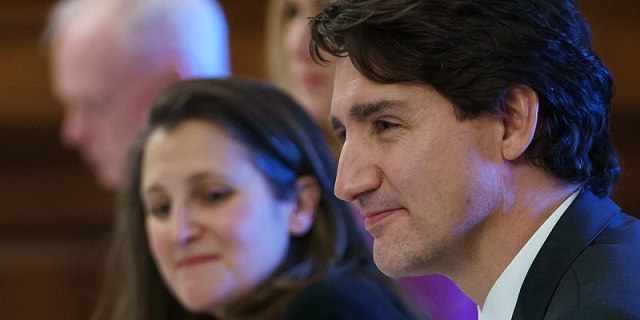Business
Federal government poised to pile on more spending and debt

From the Fraser Institute
Next week, the Trudeau government will release its fall fiscal update, which, considering the sorry state of federal finances, should demonstrate a newfound approach to spending and borrowing. But don’t hold your breath.
Although the Trudeau government describes itself as “fiscally responsible,” in reality it has a track record of unrestrained spending and large budget deficits. And it’s overseen the five highest years (2018 to 2022) of per-person program spending (adjusted for inflation) in Canadian history. Even excluding COVID-related spending, 2020 and 2021 remain the two highest years of per-person spending on record.
The Trudeau government has also run deficits every year since it took office in 2015—according to forecasts, this year’s deficit will eclipse $40 billion even though COVID is in the rearview mirror. Consequently, federal debt will have increased nearly $900 billion since 2014/15, up to $1.9 trillion for 2023/24.
While the prime minister and Finance Minister Chrystia Freeland often downplay the level of debt accumulation by noting that Canada has the lowest net debt-to-GDP ratio among the G7 countries (Germany, Italy, Japan, France, the United Kingdom and the United States), this is misleading.
Net debt is calculated as total (gross) debt minus all financial assets, with the implicit assumption that those assets could be used to offset debt. However, the Canada and Quebec Pension Plans (CPP and QPP) are included in the financial assets used to calculate net debt in Canada. But because CPP/QPP assets are needed for existing and future retirees, in reality they can’t be used to offset government debt.
Therefore, a better measure is gross debt, which measures all liabilities that require future payment of interest and/or principal by the debtor to the creditor. Compared to 29 other advanced economies, including the G7 countries, Canada’s gross debt as a share of the economy ranks 20th—meaning Canada is among the most indebted countries.
Clearly, the Trudeau government has been anything but fiscally responsible. And the current levels of spending and borrowing impose real costs on Canadians.
For example, since 2014/15 federal government debt interest costs have nearly doubled—reaching an estimated $43.9 billion, or 9.6 per cent of total revenues, for 2023/24. This means roughly one in every 10 dollars Ottawa collects from Canadian taxpayers this year will go towards debt interest costs, rather than government services or tax relief.
In light of these fiscal realities, if the Trudeau government wants to move anywhere close to a balanced budget in the foreseeable future, it must take meaningful steps in the upcoming fall fiscal update to restrain spending growth.
Unfortunately, this is unlikely to happen.
In a recent report, the Parliamentary Budget Officer (PBO) estimated that, due to spending increases, the federal government will run a deficit of $46.5 billion for 2023/24—$6.4 billion more than the government’s budget projections in March.
The government will also likely include new spending in the upcoming fiscal update meant to address housing and affordability. And will likely soon table legislation on national pharmacare, which the PBO estimates will cost $11.2 billion in 2024/25 alone.
Finally, not only does this unprecedented level of spending rack up mountains of debt, according to Bank of Canada Governor Tiff Macklem, “government spending is starting to get in the way of getting inflation back to target.” In other words, more spending by the federal government to address affordability concerns could actually worsen the problem by keeping inflation (and interest rates) higher than would otherwise be the case, eroding the purchasing power of Canadians.
While Ottawa’s fiscal situation demands a fiscally responsible fall fiscal update, it’s likely we’ll see much of the same next week from the Trudeau government—more spending and more borrowing.
Authors:
Business
Some Of The Wackiest Things Featured In Rand Paul’s New Report Alleging $1,639,135,969,608 In Gov’t Waste


From the Daily Caller News Foundation
Republican Kentucky Sen. Rand Paul released the latest edition of his annual “Festivus” report Tuesday detailing over $1 trillion in alleged wasteful spending in the U.S. government throughout 2025.
The newly released report found an estimated $1,639,135,969,608 total in government waste over the past year. Paul, a prominent fiscal hawk who serves as the chairman of the Senate Homeland Security and Governmental Affairs Committee, said in a statement that “no matter how much taxpayer money Washington burns through, politicians can’t help but demand more.”
“Fiscal responsibility may not be the most crowded road, but it’s one I’ve walked year after year — and this holiday season will be no different,” Paul continued. “So, before we get to the Feats of Strength, it’s time for my Airing of (Spending) Grievances.”
Dear Readers:
As a nonprofit, we are dependent on the generosity of our readers.
Please consider making a small donation of any amount here.
Thank you!
The 2025 “Festivus” report highlighted a spate of instances of wasteful spending from the federal government, including the Department of Health and Human Services (HHS) spent $1.5 million on an “innovative multilevel strategy” to reduce drug use in “Latinx” communities through celebrity influencer campaigns, and also dished out $1.9 million on a “hybrid mobile phone family intervention” aiming to reduce childhood obesity among Latino families living in Los Angeles County.
The report also mentions that HHS spent more than $40 million on influencers to promote getting vaccinated against COVID-19 for racial and ethnic minority groups.
The State Department doled out $244,252 to Stand for Peace in Islamabad to produce a television cartoon series that teaches children in Pakistan how to combat climate change and also spent $1.5 million to promote American films, television shows and video games abroad, according to the report.
The Department of Veterans Affairs (VA) spent more than $1,079,360 teaching teenage ferrets to binge drink alcohol this year, according to Paul’s report.
The report found that the National Science Foundation (NSF) shelled out $497,200 on a “Video Game Challenge” for kids. The NSF and other federal agencies also paid $14,643,280 to make monkeys play a video game in the style of the “Price Is Right,” the report states.
Paul’s 2024 “Festivus” report similarly featured several instances of wasteful federal government spending, such as a Las Vegas pickleball complex and a cabaret show on ice.
The Trump administration has been attempting to uproot wasteful government spending and reduce the federal workforce this year. The administration’s cuts have shrunk the federal workforce to the smallest level in more than a decade, according to recent economic data.
Festivus is a humorous holiday observed annually on Dec. 23, dating back to a popular 1997 episode of the sitcom “Seinfeld.” Observance of the holiday notably includes an “airing of grievances,” per the “Seinfeld” episode of its origin.
Alberta
A Christmas wish list for health-care reform

From the Fraser Institute
By Nadeem Esmail and Mackenzie Moir
It’s an exciting time in Canadian health-care policy. But even the slew of new reforms in Alberta only go part of the way to using all the policy tools employed by high performing universal health-care systems.
For 2026, for the sake of Canadian patients, let’s hope Alberta stays the path on changes to how hospitals are paid and allowing some private purchases of health care, and that other provinces start to catch up.
While Alberta’s new reforms were welcome news this year, it’s clear Canada’s health-care system continued to struggle. Canadians were reminded by our annual comparison of health care systems that they pay for one of the developed world’s most expensive universal health-care systems, yet have some of the fewest physicians and hospital beds, while waiting in some of the longest queues.
And speaking of queues, wait times across Canada for non-emergency care reached the second-highest level ever measured at 28.6 weeks from general practitioner referral to actual treatment. That’s more than triple the wait of the early 1990s despite decades of government promises and spending commitments. Other work found that at least 23,746 patients died while waiting for care, and nearly 1.3 million Canadians left our overcrowded emergency rooms without being treated.
At least one province has shown a genuine willingness to do something about these problems.
The Smith government in Alberta announced early in the year that it would move towards paying hospitals per-patient treated as opposed to a fixed annual budget, a policy approach that Quebec has been working on for years. Albertans will also soon be able purchase, at least in a limited way, some diagnostic and surgical services for themselves, which is again already possible in Quebec. Alberta has also gone a step further by allowing physicians to work in both public and private settings.
While controversial in Canada, these approaches simply mirror what is being done in all of the developed world’s top-performing universal health-care systems. Australia, the Netherlands, Germany and Switzerland all pay their hospitals per patient treated, and allow patients the opportunity to purchase care privately if they wish. They all also have better and faster universally accessible health care than Canada’s provinces provide, while spending a little more (Switzerland) or less (Australia, Germany, the Netherlands) than we do.
While these reforms are clearly a step in the right direction, there’s more to be done.
Even if we include Alberta’s reforms, these countries still do some very important things differently.
Critically, all of these countries expect patients to pay a small amount for their universally accessible services. The reasoning is straightforward: we all spend our own money more carefully than we spend someone else’s, and patients will make more informed decisions about when and where it’s best to access the health-care system when they have to pay a little out of pocket.
The evidence around this policy is clear—with appropriate safeguards to protect the very ill and exemptions for lower-income and other vulnerable populations, the demand for outpatient healthcare services falls, reducing delays and freeing up resources for others.
Charging patients even small amounts for care would of course violate the Canada Health Act, but it would also emulate the approach of 100 per cent of the developed world’s top-performing health-care systems. In this case, violating outdated federal policy means better universal health care for Canadians.
These top-performing countries also see the private sector and innovative entrepreneurs as partners in delivering universal health care. A relationship that is far different from the limited individual contracts some provinces have with private clinics and surgical centres to provide care in Canada. In these other countries, even full-service hospitals are operated by private providers. Importantly, partnering with innovative private providers, even hospitals, to deliver universal health care does not violate the Canada Health Act.
So, while Alberta has made strides this past year moving towards the well-established higher performance policy approach followed elsewhere, the Smith government remains at least a couple steps short of truly adopting a more Australian or European approach for health care. And other provinces have yet to even get to where Alberta will soon be.
Let’s hope in 2026 that Alberta keeps moving towards a truly world class universal health-care experience for patients, and that the other provinces catch up.
-

 Bruce Dowbiggin1 day ago
Bruce Dowbiggin1 day agoHunting Poilievre Covers For Upcoming Demographic Collapse After Boomers
-

 Business1 day ago
Business1 day agoState of the Canadian Economy: Number of publicly listed companies in Canada down 32.7% since 2010
-

 Censorship Industrial Complex1 day ago
Censorship Industrial Complex1 day agoCanadian university censors free speech advocate who spoke out against Indigenous ‘mass grave’ hoax
-

 Alberta1 day ago
Alberta1 day agoHousing in Calgary and Edmonton remains expensive but more affordable than other cities
-

 Digital ID2 days ago
Digital ID2 days agoCanadian government launches trial version of digital ID for certain licenses, permits
-

 Business2 days ago
Business2 days agoJudge Declares Mistrial in Landmark New York PRC Foreign-Agent Case
-

 Business2 days ago
Business2 days agoThe “Disruptor-in-Chief” places Canada in the crosshairs
-

 International2 days ago
International2 days agoWorld-leading biochemist debunks evolutionary theory








